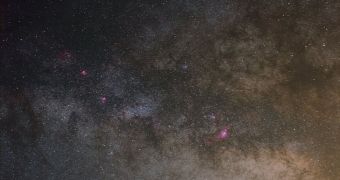A place in Siberia will soon become the center of international research into the secret of the Universe as it prepares to host the world’s biggest gamma ray detection devices.
The Tunka Valley, about 100km (62 miles) west of Lake Baikal and close to Russia’s border with Mongolia, is already home to several large-scale experiments to study cosmic rays and gamma rays, RT reports.
The site is currently being run by Russian and German astrophysicists and has about 175 photomultiplier stations hunting for Cherenkov radiation on moonless and cloudless nights.
While the technique used here is different from traditional imaging telescopes, it allows for a greater sensitivity thanks to a large area of detection, since the devices are spread over 3 square kilometers (1.15 square miles).
The observatory here will be expanding soon to include 1,000 detectors spread across at least 10 square kilometers (3.86 square miles) in the next three years.

 14 DAY TRIAL //
14 DAY TRIAL //